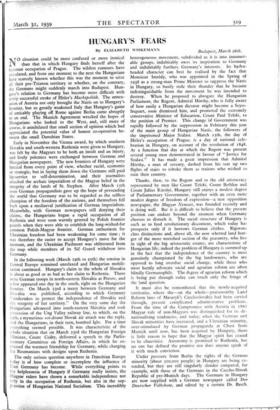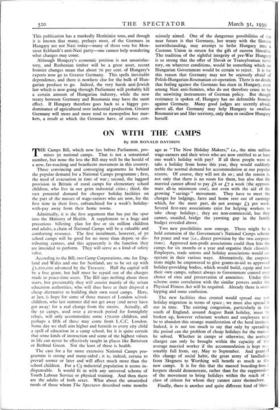HUNGARY'S FEARS
By ELIZABETH WISKEMANN
No situation could be more confused or more ironical than that in which Hungary finds herself after the German occupation of Prague. The wildest rumours have circulated, and from one moment to the next the Hungarians have scarcely known whether this was the moment to seize all their pre-Trianon territory or whether, on the contrary, the Germans might suddenly march into Budapest. Hun- gary's relation to Germany has become more difficult with every successful stroke of Hitler's Machtpolitik. The annex- ation of Austria not only brought the Nazis on to Hungary's frontier, but so greatly weakened Italy that Hungary's game of amicably playing off Rome against Berlin came abruptly to an end. The Munich Agreement wrecked the hopes of Hungarians who looked to the West, and, still more of course, it annihilated that small section of opinion which had appreciated the potential value of honest co-operation be- tween the small Danubian States.
Early in November the Vienna award, by which southern Slovakia and south-western Ruthenia were given to Hungary, was felt by the Magyars to be both an insult and an injury, and lively polemics were exchanged between German and Hungarian newspapers. The new frontiers of Hungary were farcical from every point of view, whether racial, economic or strategic, but in laying them down the Germans still paid lip-service to self-determination, and their journalists attacked the archaic imperialism of the Magyar belief in the integrity of the lands of St. Stephen. After March 15th even German propagandists gave up the hope of persuading the world that Germany was to be regarded as the selfless champion of the freedom of the nations, and themselves fell back upon a mediaeval justification of German imperialism. Meanwhile, with German newspapers still denying their claims, the Hungarians began a rapid occupation of all Ruthenia and were soon warmly greeted by Polish frontier guards when they were able to establish the long-wished-for common Polish-Magyar frontier. German enthusiasm for Ukrainian freedom had been weakening for some time ; it was therefore the easier to accept Hungary's move for the moment, and the Ukrainian Piedmont was obliterated from the map while members of its SM Guard withdrew into Germany.
In the following week (March 19th to 25th) the tension in Central Europe remained unrelaxed and Hungarian mobili- sation continued. Hungary's claim to the whole of Slovakia is about as good or as bad as her claim to Ruthenia. There were German troops in north-eastern Slovakia at Presov, and a few appeared one day in the south, right on the Hungarian frontier. On March 23rd a treaty between Germany and Slovakia was published, according to which Germany " undertakes to protect the independence of Slovakia and the integrity of her territory." On the very same day the Hungarians advanced into south-eastern Slovakia and took possession of the Ung Valley railway line, to which, on the 24th, a mysterious soi-disant Slovak air attack was the reply, and the Hungarians, in their turn, bombed Iglo. For a time everything seemed possible. It was characteristic of the r, hole situation that on March 23rd the Hungarian Foreign Minister, Count Csaky, delivered a speech to the Parlia- mentary Committee on Foreign Affairs, in which he ex- pressed the warmest friendship for Germany, while charging the Roumanians with designs upon Ruthenia.
The only serious question anywhere in Danubian Europe today is of how complete or incomplete the influence of Nazi Germany has become. While everything points to the helplessness of Hungary if Germany really insists, the Magyar rulers have shown a remarkable independence not only in the occupation of Ruthenia, but also in the sup- pression of Hungarian National Socialism. This incredibly Budapest, March 26th. heterogeneous movement, subdivided as it is into innumer- able groups, indubitably owes its inspiration to Germany and indubitably furthers Germany's interests. Its hydra- headed character can best be realised by the fact that Monsieur Imredy, who was appointed in the Spring of 1938 as a strong-man Prime Minister to suppress the Nazis in Hungary, so busily stole their thunder that he became indistinguishable from the movement he was intended to destroy. When he proposed to abrogate the Hungarian Parliament, the Regent, Admiral Horthy, who is fully aware of how easily a Hungarian dictator might become a Seyss- Inquart, soon dismissed him, and promoted the extremely conservative Minister of Education, Count Paul Teleki, to the position of Premier. This change of Government was rapidly followed by the suppression in February this year of the main group of Hungarian Nazis, the followers of the imprisoned Major Szalasi. March t5th, the day of Hitler's occupation of Prague, is a day of national cele- bration in Hungary, on account of the revolution of 1848. At a function that day at which the Regent was present several young men demonstrated in favour of " Justice for Szalasi." It has made a great impression that Admiral H6rthy, a man of seventy, dashed from his seat up two flights of stairs to rebuke them as traitors who wished to ruin their country.
Thanks, then, to the Regent and to the old aristocracy represented by men like Count Teleki, Count Bethlen and Count Julius Karolyi, Hungary still enjoys a modest degree of Parliamentary Government, together with an even more modest degree of freedom of expression—a new opposition newspaper, the Magyar Nemzet, was founded recently and is doing well. But it is difficult to believe that the present position can endure beyond the moment when Germany chooses to disturb it. The social structure of Hungary is such as to feed revolutionary discontent, which today has prospects only if it borrows German clothes. Rigorous class distinctions and, above all, the now whetted land hun- ger of the more wretched section of the peasantry, who live in sight of the big aristocratic estates, are characteristic of Hungarian life; indeed the problem of Hungary is summed up in the fact that the independence of the country is most genuinely championed by the big landowners, who are opposed to long overdue social change, while those who most keenly advocate social and agrarian reform are often blindly Germanophile. The degree of agrarian reform which is being put through today can touch only the fringe of the land question.
It must also be remembered that the newly-acquired territories, where the—on the whole—praiseworthy Land Reform laws of Masaryk's Czechoslovakia had been carried through, present complicated administrative problems. From the time of the Compromise with Austiia in 1867 Magyar rule of non-Magyars was distinguished for its de- nationalising tendencies, and today, when the German and Slovak minorities have increased, and a Ukrainian minority, over-stimulated by German propaganda at Chust from Munich until now, has been acquired by Hungary, there is little reason to hope that the Magyar spirit has ceased to be chauvinist. Autonomy is promised to Ruthenia, but no one has defined the promise nor does anyone speak of it with much conviction.
Under pressure from Berlin the rights of the German minority (about 5oo,000 people) in Hungary are being ex- tended, but they are still singularly slender compared, for example, with those of the Germans in the Czecho-Slovak Republic of pre-Munich days. The Germans in Hungary are now supplied with a German newspaper called Der Deutscher Volksbote, and edited by a certain Dr. Basch. This publication has a markedly Henleinist tone, and though it is known that many, perhays most, of the Germans in Hungary are not Nazi today—many of them vote for Mon- sieur Eckhardt's anti-Nazi party—one cannot help wondering what changes may come.
Although Hungary's economic position is not unsatisfac- tory, and Ruthenian timber will be a great asset, recent frontier changes mean that about 7o per cent. of Hungary's exports now go to Greater Germany. This spells inevitable dependence, and there is nowhere else for the bulk of Hun- garian produce to go. Indeed, the very harsh anti-Jewish law which is now going through Parliament will probably kill a certain amount of Hungarian industry, while the new treaty between Germany and Roumania may have the same effect. If Hungary therefore goes back to a bigger pre- dominance of agricultural over industrial production, Greater Germany will more and more tend to monopolise her mar- kets, a result at which the Germans have, of course, con- sciously aimed. One of the dangerous possibilities of the near future is that Germany, her treaty with the Slovaks notwithstanding, may attempt to bribe Hungary into a Customs Union in return for the gift of eastern Slovakia. The tradition of the rightful integrity of pre-War Hungary is so strong that the offer of Slovak or Transylvanian terri- tory, on whatever conditions, would be something which no Hungarian Government would be certain to reject. It is for this reason that Germany may not be seriously afraid of Polish-Hungarian-Ronmanian co-operation. There is no doubt that feeling against the Germans has risen in Hungary, even among Nazi anti-Semites, who do not therefore cease to be the unwitting instruments of German policy. But though resistance is spoken of, Hungary has no defensible frontier against Germany. Many good judges are secretly afraid, above all, that Germany may help Hungary to swallow Roumaniran and Slav territory, only then to swallow Hungary herself.



































































 Previous page
Previous page